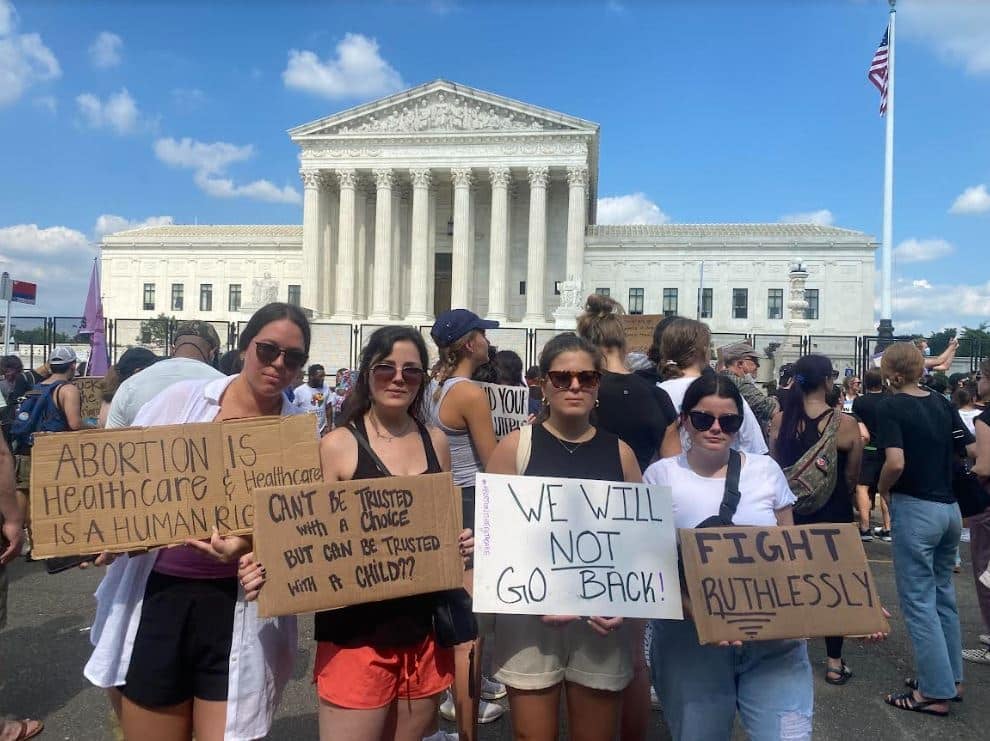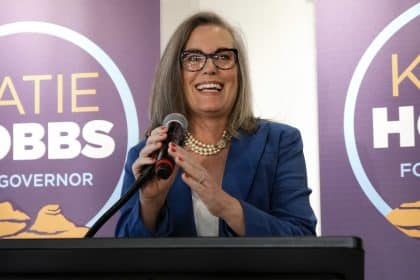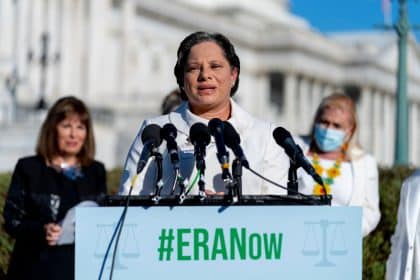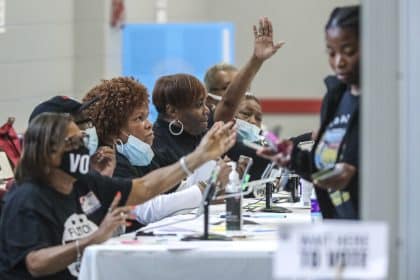Abortion-Rights Supporters Prevailed in All Midterm Ballot Measures

WASHINGTON — It wasn’t just the control of the U.S. House and Senate that was hanging in the balance as voters went to the polls Tuesday. In states across the nation ballots were cast on a range of health care issues including abortion, Medicaid expansion and the legalization of cannabis.
The top health care headline of the night was that voters in California, Vermont and Michigan all approved ballot measures enshrining abortion rights in their state constitutions, while those in two traditionally red states — Kentucky and Montana — rejected measures that would have restricted access to reproductive care.
The votes, of course, were a consequence of the U.S. Supreme Court’s decision in June to overturn Roe v. Wade, the landmark ruling that had protected abortion as a constitutional right for nearly 50 years.
Heading into the midterms, Democrats had made abortion rights central to their campaign to maintain control of Congress, but polls heading into the pre-election weekend suggested Americans were more concerned with the economy as they decide the outcome of federal races.
Evidently, no one told that to the voters in the five states where abortion was also the topic of an array of, in some cases, very different ballot propositions.
In California voters ratified Proposition 1, which establishes an individual’s right to “reproductive freedom: in the state constitution, including a specific right to contraception and abortion access. With 42% of the vote counted as of 3:30 p.m. Wednesday afternoon, the measure had garnered the support of 65% of those who went to the polls, while 42% voted against the measure.
The Vermont amendment guarantees an individual’s right to personal control of their reproductive health and decision-making. With 99% of the vote counted as of 3:30 p.m. Wednesday, 77.2% of voters had cast a ballot in favor of the measure, while 22.8% voted no.
In Michigan, voters were asked to decide whether to amend the state constitution to protect not just abortion but also a wide array of other reproductive care.
This included abortion, contraception, prenatal care, postpartum care, miscarriage management, sterilization and infertility.
The amendment also enabled the state to regulate abortion after the fetus is viable, but not prohibit the procedure when the woman’s life or physical or mental health is at stake.
With 98% of the vote counted on Wednesday, 56.7% had voted for the measure and 43.3% had voted against.
Voters in Montana and Kentucky, meanwhile, were asked to weigh whether they want their state governments to restrict abortion access.
In both cases, the answer appears to have been a resounding no.
Kentucky immediately banned abortion after the Supreme Court overturned Roe. It is now a crime for a doctor to perform the procedure, punishable by up to five years in prison.
There is an exception for when the woman’s life is in danger, but not for victims of rape or incest. A woman cannot be prosecuted for having an abortion.
On Tuesday, voters were asked whether an amendment should be added to the state constitution that would explicitly state abortion isn’t legally protected — and that tax dollars couldn’t be spent on it.
With 91% of votes counted Wednesday afternoon, 52.4% of the state’s voters had said no, thank you, while 47.6% voted in favor of the measure.
If Montana’s ballot initiative, LR-131, a referendum for the Born-Alive Infants Protection Act, had passed, an embryo or fetus would have been considered a “person” under the law with a right to medical care if born prematurely or survives an attempted abortion.
It would also have become illegal — and punishable by up to 20 years in prison and a $50,000 fine — for a health care worker to not try to save the life of a “born-alive infant.”
Eighteen states already have so-called born-alive laws on the books. But Montana’s would have been the first to be passed by referendum, rather than by state lawmakers themselves.
Instead, it belly flopped at the polls. With 82% of the vote counted by Wednesday afternoon, 52.4% rejected the measure, while only 47.6% embraced it.
Tuesday’s ballot initiatives came in the wake of a similar vote in Kansas in August in which tougher restrictions on abortion access were rejected by an 18 percentage point margin or about 165,000 votes.
Of course, abortion wasn’t the only health-related issue on the ballot Tuesday.
In South Dakota, voters were asked to decide whether to expand Medicaid under the Affordable Care Act.
Amendment D would direct the state to expand Medicaid next year to any person aged 18 to 65 with an income up to 133% of the federal poverty level — about $19,000 per year for an individual or $39,000 per year for a family of four.
Prior to the vote, South Dakota was one of only 12 states that has yet to expand Medicaid under the Obama-era health care law.
But it doesn’t have that distinction anymore. With 95% of the vote counted as of 3:30 p.m. Wednesday, 56.2% of voters had voted in favor of the measure, while 43.8% had voted no.
And as a result, South Dakota is now the seventh GOP-controlled state to expand Medicaid.
In 2020, voters in Missouri and Oklahoma approved ballot initiatives to expand Medicaid, following the lead of successful ballot initiatives in 2018 in Nebraska, Idaho and Utah.
Those states, like Maine in 2017, bypassed Republican governors and legislatures to expand Medicaid by public referendum.
In Arizona, voters resoundingly voted in favor of limiting interest rates for debt accrued from receiving health care services.
Arizona Proposition 209 caps the interest rates that can be charged for medical debt at 3%.
It also limits debt collectors’ ability to seize a person’s home, belongings, automobile or wages if they owe money for medical services by exempting more of a household’s assets from forfeiture or garnishment.
It does so in part by increasing the value of the debtor’s home protection from $250,000 to $400,000, and decreasing the portion of weekly disposable income subject to debt collection from 25% to 10%.
With 66% of the votes counted on Wednesday, 72% of voters had cast ballots in favor of the measure while 28% had voted no.
In Oregon, voters may be on the brink of making health care history.
If Ballot Measure 111 passes, Oregon would be the first state in the union to formally make affordable health care a human right.
The proposed amendment states: “It is the obligation of the state to ensure that every resident of Oregon has access to cost-effective, clinically appropriate and affordable health care as a fundamental right.”
It goes on to say that the state’s obligation “must be balanced against the public interest in funding public schools and other essential public services.”
State Sen. Elizabeth Steiner Hayward, the main sponsor behind the ballot measure, has said making health care a human right is a value statement and is not aimed at pushing Oregon to a single-payer health care system.
Opponents of the measure are worried about its costs and its potential to prompt litigation.
As of Wednesday afternoon, with 64% of the vote counted, the yes vote was in the lead at 50.49%, while the no vote stood at 49.51%.
In addition to abortion rights, voters in California were also asked to consider a measure that would ban flavored tobacco for vapes.
With 42% of the vote counted Wednesday, the measure appeared to be on a clear road to victory with 62.3% of midterm voters voting yes and 37.7% voting no.
In a number of states, voters are also being asked whether cannabis should be legalized for recreational use.
The states hosting such ballot initiatives Tuesday included Arkansas, Maryland, Missouri, North Dakota and South Dakota.
In two of them, Maryland and Missouri, voters approved the legal recreational use of cannabis, with Missouri’s constitutional amendment also allowing certain people incarcerated on cannabis-related offenses to petition for release.
The vote in Maryland was 65.6% in favor of legalizing marijuana for people over age 2, while 34.4% voted no, with 82% of the vote now in.
In Missouri, 51.1% voted yes on a similar measure, while 46.9% voted no, with 89% of the vote now counted.
Voters in three states, however, voted against legalizing cannabis.
These were Arkansas, where the vote was 56.3% against and 43.7% approving of the proposal, with 98% of the vote in; in North Dakota, 54.9% voted no, while 45.1% voted yes, with 99% of the vote in; in South Dakota, where 99% of the vote has been counted, 52.9% voted no, while 47.1% said they would favor legalizing cannabis.
On a related note, voters in Colorado voted in favor of decriminalizing use and possession of some hallucinogenic/entheogenic plants and fungi. With 81% of the vote in, the yes vote was 51.1% to the no vote’s 48.9%.
Dan can be reached at [email protected] and @DanMcCue
























